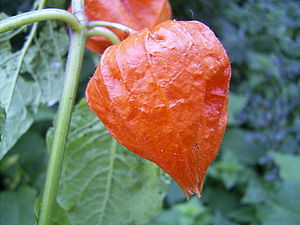Note: This is a project under development. The articles on this wiki are just being initiated and broadly incomplete. You can Help creating new pages.
Difference between revisions of "Physalis alkekengi - Bladder cherry"
Chaithrika (talk | contribs) (+Common names) |
m (Prabhakar moved page Physalis alkekengi to Bladder cherry (Physalis alkekengi)) |
(No difference)
| |
Revision as of 13:49, 29 March 2018
Physalis alkekengi (bladder cherry, Chinese lantern,[1] Japanese-lantern, strawberry groundcherry,[2] or winter cherry;) is a relative of P. peruviana (Cape gooseberry). It is easily identifiable by the large, bright orange to red papery covering over its fruit, which resembles paper lanterns.
Description
It grows naturally in the regions covering Southern Europe to South Asia and Japan. It is a perennial herbaceous plant growing to 40–60 cm tall, with spirally arranged leaves 6–12 cm long and 4–9 cm broad. The flowers are white, with a five-lobed corolla 10–15 mm across, with an inflated basal calyx which matures into the papery orange fruit covering, 4–5 cm long and broad.
It is a popular ornamental plant, though it can be invasive with its wide-spreading root system sending up new shoots some distance from where it was originally planted. In various places around the world, it has escaped cultivation.[3]
Uses
The dried fruit of P. alkekengi is called the golden flower in the Unani system of medicine, and used as a diuretic, antiseptic, liver corrective, and sedative.
Common name
- English - Bladder cherry
